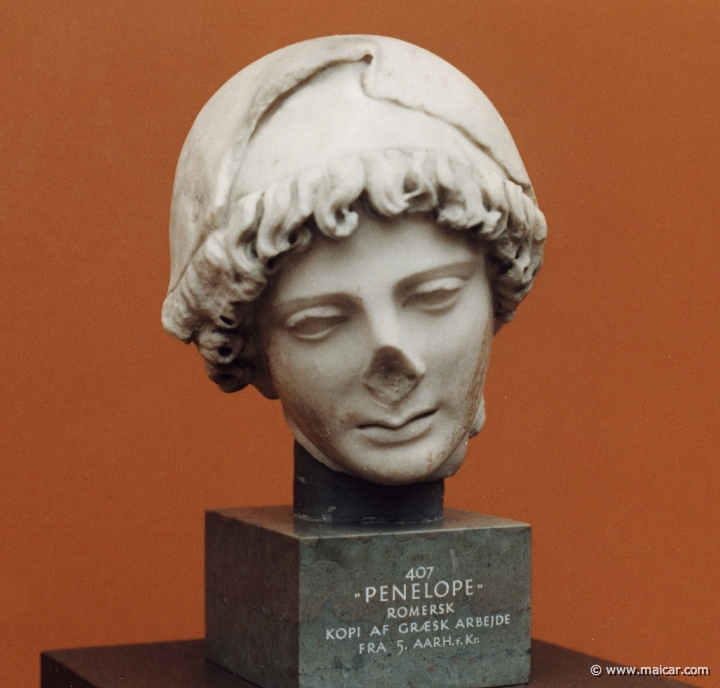Discovering Penelope Jiminez: A Timeless Tale Of Loyalty And Wit
Have you ever considered the enduring power of a story, one that spans centuries yet still speaks to us today? It's really quite something, how tales from long ago can capture our thoughts and feelings, even now, in this very modern world. We often hear about heroes and their grand adventures, but what about the people they leave behind, those who wait and hold the fort? There's a particular figure from ancient lore whose steadfast spirit and cleverness continue to fascinate many people. She truly represents a kind of strength that is, arguably, quite rare.
Today, we're taking a closer look at a character whose name echoes through the halls of myth and literature, a woman whose journey, while perhaps less traveled in terms of physical distance, was certainly just as challenging as any hero's. Her story is one of patience, of very clever thinking, and of a deep, abiding loyalty that stood the test of time, and then some. This figure, as a matter of fact, is central to one of the greatest epic poems ever told, a story that has shaped our ideas of home, hardship, and the human spirit.
So, we'll be exploring the life and times of Penelope, the wife of the legendary hero Odysseus, ruler of the small island of Ithaca. Her experiences, you know, offer a profound look at resilience and the quiet courage it takes to maintain hope when faced with immense pressure. It's a story that, honestly, holds many lessons about perseverance and the true meaning of commitment, even when things seem, perhaps, quite impossible.
- Polands Newest Billionaire Cashes In On Pandemic Fueled E Commerce Frenzy To Join The Three Comma Club
- Lindsey Wixson Net Worth
Table of Contents
- Who Was Penelope? A Glimpse into Her Mythical Life
- Personal Details and Bio Data of Penelope
- The Long Wait: Penelope's Twenty Years of Faithfulness
- The Suitors: A Palace Under Siege
- The Bow Challenge: A Test of Destiny
- The Return of Ulysses and the Reunion
- Penelope's Support System and Divine Intervention
- Penelope's Legacy and Enduring Impact
- Frequently Asked Questions About Penelope
Who Was Penelope? A Glimpse into Her Mythical Life
Penelope was the wife of the hero Odysseus, ruler of the small island of Ithaca. Her life, as we know it from ancient tales, was one marked by a remarkable devotion. She remained faithful to her husband for twenty years while awaiting his return from the Trojan War, a very long period indeed. This faithfulness is, in a way, the central thread of her entire story, something that truly defines her character. She was, you see, a figure of immense patience and enduring hope, qualities that were tested time and time again.
Odysseus, her husband, was a Greek hero from Ithaca known for his cunning. After helping to win the Trojan War, he was forced to wander the world for ten years before returning home. So, for ten years he was gone from the war, and then ten more years of wandering, making it a full two decades that Penelope had to wait. This situation, honestly, put Penelope in a very difficult position back home on Ithaca. She was left to manage the household and their son, Telemachus, while facing constant pressures.
Her story is very much intertwined with the broader narrative of the Greek heroes and their adventures. While men like Achilles, who was swift and fierce, were busy fighting and achieving great deeds on the battlefield, Penelope was performing her own kind of heroism back home. Achilles, as a matter of fact, was one of the greatest warriors of Greek mythology, instrumental in helping the Greeks retrieve Helen and decimate their foes during the Trojan War. Penelope's quiet strength at home, however, was just as vital to the survival of her family and her husband's legacy, perhaps even more so in some respects.
- Inside 340 Million Deal Fernando Tatis Jr
- The Dodgers Signed The Reigning Cy Young Winner And It Will Cost Them Much More Than His Salary
Personal Details and Bio Data of Penelope
Here is a quick look at some key aspects of Penelope's life, as drawn from the ancient stories:
| Name | Penelope |
| Spouse | Odysseus (also known as Ulysses) |
| Home Island | Ithaca |
| Primary Role | Wife of the ruler of Ithaca, steadfast guardian of her home and family. |
| Key Virtue | Unwavering faithfulness and loyalty to her husband. |
| Duration of Wait for Husband's Return | Twenty years |
| Notable Challenges Faced | Dealing with numerous suitors, managing her household in her husband's absence. |
The Long Wait: Penelope's Twenty Years of Faithfulness
Penelope's faithfulness is a cornerstone of her character, a trait that makes her stand out in the narratives of Greek mythology. She remained faithful to her husband for twenty years while awaiting his return from the Trojan War. This was not a short period; it was a very long stretch of time, two full decades, during which she lived with uncertainty and constant pressure. Her commitment to Odysseus, even in his prolonged absence, is a powerful example of devotion, and that is a truly significant aspect of her story.
The Trojan War itself was a massive conflict, and Odysseus, as a Greek hero from Ithaca, played a big part in it. After helping to win the Trojan War, he was forced to wander the world for ten years before returning home. So, the initial ten years of the war, plus another ten years of his difficult journey back, meant that Penelope's wait was, arguably, one of the longest and most challenging in all of ancient storytelling. She had no real way of knowing if he was alive or if he would ever come back, which must have been an incredibly heavy burden to carry, you know.
During this very long period, Penelope faced a particular set of trials that tested her resolve every single day. Her husband's kingdom, a small island called Ithaca, needed its ruler, and in his absence, many thought he was gone for good. This situation created a very specific kind of problem for Penelope, one that would become a major part of her life during those twenty years. She had to navigate the complexities of managing a royal household without its king, all while maintaining her personal integrity, which was a pretty big ask, honestly.
The Suitors: A Palace Under Siege
One of the biggest challenges Penelope faced during Odysseus's long absence was the presence of the suitors. The suitors of Penelope made great entertainments, and riot in her palace till night. These men, many of them nobles from Ithaca and nearby islands, had come to seek Penelope's hand in marriage, believing Odysseus was dead and that one of them should become the new king. Their behavior was, to say the least, rather disruptive, turning her home into a place of constant feasting and disorder. It was a very difficult situation for her to manage, as a matter of fact.
Phemius, a bard, sings to them the return of the Grecians, till Penelope puts a stop to the song. This detail shows us a bit about the atmosphere in the palace; there was music and storytelling, but it was often at the suitors' behest, not Penelope's comfort. Her stopping the song suggests her distress and her longing for a different kind of return, her husband's. She was, in a way, constantly reminded of her predicament by their presence and their demands, and it must have been quite wearing, you know.
Penelope, to put an end to the solicitation of the suitors, proposes to marry the person who shall first bend the bow of Ulysses, and shoot through the targets. This was a very clever move on her part, a way to buy more time and, perhaps, to set a challenge that she believed only Odysseus could accomplish. She also descends, and receives the presents of the suitors, a custom of the time, but one that surely added to the pressure she felt. It was a constant negotiation, a delicate balance she had to maintain to keep her household intact and protect her son, Telemachus, from the suitors' influence, and that is quite a feat, honestly.
The Bow Challenge: A Test of Destiny
The bending of Ulysses' bow was a pivotal moment in Penelope's story, a turning point that would decide her future and the fate of Ithaca. Penelope, to put an end to the solicitation of the suitors, proposes to marry the person who shall first bend the bow of Ulysses, and shoot through the targets. This was no ordinary bow; it was Odysseus's personal weapon, known to be incredibly difficult to string and use. Her proposal was a very astute move, a way to set a seemingly impossible task that only someone with Odysseus's strength and skill could achieve, or so she hoped, anyway.
The challenge was simple in its description but immensely difficult in its execution: bend the bow and shoot an arrow cleanly through twelve axe-heads lined up in a row. The suitors, despite their arrogance and their constant presence in her palace, were unable to complete this task. Each man tried, but the bow remained unstrung in their hands. This inability of the suitors to even string the bow, let alone shoot it, further highlights the extraordinary nature of Odysseus and the unique bond he shared with his weapon, a very telling detail, you know.
It was during this challenge, or very soon after it, that Odysseus, disguised as a mendicant, would reveal himself. The dialogue of Ulysses with Eurymachus, one of the leading suitors, likely took place around this time, as Odysseus began to assess the situation and prepare for his return to power. While fix'd in thought the pensive hero sate, a mendicant approach'd the royal hall, a scene that sets the stage for the dramatic events to come. This challenge, therefore, was not just about finding a new husband for Penelope; it was, in a way, a test of who truly belonged in the palace, and who was worthy of the throne, and that is a very important distinction.
The Return of Ulysses and the Reunion
The return of Ulysses, or Odysseus, to Ithaca was a moment Penelope had waited twenty long years for, though she did not immediately recognize him. Argument Euryclea awakens Penelope with the news of Ulysses' return, and the death of the suitors. Euryclea, an old and loyal nurse, was one of the first to know the truth, having recognized Odysseus by a scar. Her excitement was immense, but Penelope's reaction was, perhaps, more cautious, and that is quite understandable, you know.
Penelope, upon hearing this news, supposes some god has punished them, meaning the suitors, and she doesn't immediately believe it's her husband. This disbelief is a very human response, given the long absence and the many tricks that gods and men were known to play in those times. She had been through so much, and her caution was a way to protect herself from further disappointment or deception. It's a very poignant moment, showing her deep weariness and her need for absolute proof, as a matter of fact.
The discovery of Ulysses to Telemachus, their son, happened earlier, as Telemachus arriving at the lodge of Eumaeus, sends him to carry Penelope the news of his return. Minerva, the goddess, appearing to Ulysses, commands him to reveal himself to his son. The reunion between husband and wife is one of the most famous and moving scenes in literature. Penelope tests Odysseus with a secret only they would know, concerning their marriage bed, before finally accepting him. This moment, you know, signifies the end of her long, trying wait and the restoration of her family and household, and that is truly a powerful resolution to her story.
Penelope's Support System and Divine Intervention
Even in her isolation and constant pressure, Penelope was not entirely alone; she had a network of support, both human and divine. Her loyal nurse, Euryclea, played a very crucial role, as we saw when Euryclea awakens Penelope with the news of Ulysses' return, and the death of the suitors. Euryclea's steadfastness and her recognition of Odysseus were vital to the unfolding of events, providing a trusted confidante for Penelope, which was, honestly, quite necessary given her difficult situation.
Beyond human help, Penelope also received comfort from the gods. Penelope is apprised of the suitors' plans, but comforted in a dream by Pallas, in the shape of her sister Iphthima. Pallas, which refers to the goddess Athena, was a constant protector of Odysseus and his family. Her intervention in Penelope's dream, taking the form of her beloved sister, offered a very personal and reassuring message, providing strength when Penelope needed it most. This divine support highlights the importance of Penelope's role in the grand scheme of things, and that is a truly significant aspect of her narrative.
The broader world of Greek mythology is filled with such figures. The nymphs were minor divinities who took the form of beautiful young women. They represented diverse aspects of nature, including water, mountains, trees, and even specific places. While not directly aiding Penelope in her immediate struggles, their presence in the mythical world reminds us of the pervasive influence of the divine. Similarly, the mention of Sparta, whose walls a range of hills, and now proud Sparta with their wheels resounds, grounds Penelope's story in the larger geographical and cultural context of the Greek world, showing that her tale is part of a much bigger tapestry of ancient life and belief, and that is a fascinating connection to make.
Penelope's Legacy and Enduring Impact
Penelope's story, as it has been passed down through generations, continues to resonate with people today, many centuries after it was first told. Her enduring faithfulness to her husband for twenty years while awaiting his return from the Trojan War is, perhaps, her most famous trait. This loyalty, maintained through immense pressure and the constant presence of demanding suitors, has made her a symbol of marital devotion and unwavering commitment. It's a very powerful idea, you know, this idea of holding true to someone for so long, through so much uncertainty, and that is a very profound concept, honestly.
Her cleverness, too, is a significant part of her legacy. The way she managed the suitors, using delaying tactics like weaving and unweaving a shroud, and then proposing the impossible bow challenge, shows a mind that was sharp and resourceful. She was not just a passive figure waiting; she was actively, very cleverly, trying to protect her home and her family. This combination of patience and wit makes her a truly complex and admirable character, someone who used her intelligence to survive a very difficult situation, and that is quite inspiring, in a way.
In modern times, Penelope's story is still explored in literature, art, and discussions about gender roles and resilience. She stands as a counterpoint to the more active, adventurous male heroes, showing that strength can also be found in steadfastness, in managing a household, and in preserving hope against long odds. Her narrative reminds us that heroism comes in many forms, and that the quiet, persistent acts of loyalty and perseverance can be just as impactful as any grand battle. You can learn more about ancient Greek narratives on our site, and link to this page for more on legendary figures. Her tale, honestly, remains a very important part of our collective human story, offering lessons that are, arguably, quite timeless. For more on the historical context of such figures, consider exploring resources like Britannica's entry on the Odyssey.
Frequently Asked Questions About Penelope
Here are some common questions people often have about Penelope, the wife of Odysseus:
How long did Penelope wait for Odysseus?
Penelope remained faithful to her husband for twenty years while awaiting his return from the Trojan War. This period included the duration of the war itself and Odysseus's subsequent ten-year journey home, making it a very long and trying time for her.
What challenge did Penelope propose to the suitors?
To put an end to the constant demands of the suitors, Penelope proposes to marry the person who shall first bend the bow of Ulysses, and shoot through the targets. This was a very difficult task, as only Odysseus himself possessed the strength and skill to perform it.
Who was Euryclea in Penelope's story?
Euryclea was a very loyal and old nurse in Odysseus's household. She plays a crucial role in the story, as she awakens Penelope with the news of Ulysses' return, and the death of the suitors, being one of the first to recognize Odysseus upon his secret arrival back in Ithaca.

Penélope Cruz - Wikipedia

Penelope Cruz wallpaper | 1280x1024 | #50463

Penelope Wife Of Odysseus